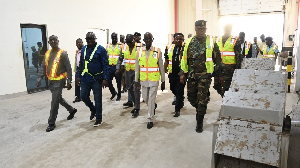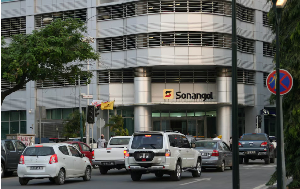By Solomon Davids
Ghana recently joined the rest of the world to observe World Water Day, a day set aside to focus on water, the most important need of man, after air.
The occasion coincided with one interesting event that caught my attention due to its neglect by authorities, “Longest Toilet Queue Day.” It may not mean anything to a lot of people who have not experienced any ordeal in a toilet queue; but, to those who live or have once lived in areas like Accra New Town, Nima, Mamobi, Kotobabi, parts of Dome, Zongo, Sukura, Chorkor, Lapaz and other places like them, such a day means a lot even though many of them did not notice it.
On the day itself, I was watching the news on television when that news item came up. To my utmost surprise, I saw a long queue of uniformed school children with different colours of plastic cups in their hands; as they raised the cups, they shouted, “We want toilet, we want toilet.” I said, “What!!!, what has toilet got to do with cups? Are they going to take the toilet in the cups?”
Then came the realisation that they were asking for toilets as well as water; so whilst the cups stood for the demand for water, the shouts and the queue were meant to draw the authorities’ attention to the need for toilet facilities in areas that need them most. I don’t know if it was planned but coinciding these two events makes a lot of sense. Toilets need water to function well even if they are not Water Closets (WCs). One needs water to keep even the Kumasi Ventilated Improved Pit (KVIP) toilets in good conditions for human use.
It is a pity that many, if not most, houses in the aforementioned areas and the likes do not have toilet facilities. Residents, most of whom are tenants, have to make do with the few public toilets available; a demand to the landlord/lady for an in-house toilet facility would certainly lead to summary ejection. After all, the tenant was aware of the situation before agreeing to settle in the house.
In fact, what we call public toilets are not places of convenience as we all know. They are rather places of inconvenience. I can say without any fear of being challenged that, over ninety percent (90%) of the public toilets in Accra are not fit for human use. They are a major source of diseases in the country; anyone who disagrees can carry out a study on that to prove me wrong.
Some are flushed by water fetched in buckets by the attendants, others have leakages that keep the floor wet at all times and there are those which are so dirty that one wonders why people still use them. As for the pits, the least said about them, the better.
Talking about toilet queues reminds me of some experiences I had at Accra New Town, a suburb of Accra, where many of the houses are compound houses without toilet facilities. Tenants have to ‘travel’ distances to the nearest public toilet to attend to nature’s call. Due to the pressure on such facilities, they are almost always in a bad state, especially the pits which have no WC facility. The situation at Accra New Town has improved a bit with the reconstruction of the old toilet into a WC facility managed by a private entity.
In the 80’s and 90’s, the facility was a very interesting one. It was a ten seater toilet (sorry, a ten squatter toilet because one had to squat and not sit when attending to nature’s call) that served a large number of residents. According to those who know about the facility very well, it was constructed by Osagyefo Dr. Kwame Nkrumah to serve pupils from the Accra New Town Experimental School but later turned into a public. Toilet queues were very regular in the mornings and evenings, with occasional mid-day ones. At times, one may have to wait for as many as thirty (30) or forty (40) persons waiting for their turns to ‘ease’ themselves in the stench-filled room. It was truly an interesting experience.
As one waits for his/her turn, then comes another person with a supposedly more serious situation; a person may come holding the buttocks, with a frowned face as if s/he is in labour. The person is, therefore, at the mercy of the first person in the queue, who may or not allow the ‘stranded’ person the chance to break protocol. This may not be well pleasing to others in the queue who may also be in a similar situation but succumbing to laid down rules.
I vividly recollect a funny but serious incident in one of the queues at the Accra New Town toilet some years back. There was a long queue with a stoutly built man in front. As the man waited impatiently for his turn, there came the sweeper of the facility who also wanted to attend to nature’s call; he quickly took advantage of his position as a worker and broke protocol by overtaking the man in front.
Unfortunately for him, the man did not know him so decided to stop him from doing the unconventional. Infuriated by this affront, the sweeper got hold of a broom and blocked the entrance to the facility with baskets-full of used toilet paper and declared that no one was going to use the facility until he finished sweeping it. This attracted pleas from members of the queue. It took series of pleas from them, including the stoutly built man, for him to rescind his decision.
Another interesting thing about that same toilet facility is that it has, on several occasions, exploded putting the lives of users at a great risk. The explosions were caused by the heat that emanated from the toilet. The heat or gas that comes from the pits is strong enough to generate electricity for the township. It is very unfortunate that in the 21st Century we still have some of these toilet facilities and even worse ones in the city of Accra.
To make the case of toilet facilities in the city worse, many restaurants, chop bars and drinking spots have not made any provision for clients who might want to ‘ease’ themselves; it is a taboo to ask for a toilet in some of these bars. I happened to go to a restaurant at North Kaneshie with some friends and as we approached the spot, I started experiencing some discomfort in my tummy. Thinking that the restaurant (name withheld) had a toilet, I relaxed until we reached the place. I walked to one of the attendants and asked if I could use their washroom. She confidently directed me to a door I ran to and began to open with alacrity. To my utmost surprise, it was a urinal; there was no toilet facility. Stranded, I quickly walked out and asked my friend to drive me home to pick something. Fortunately, I got there in time to salvage a catastrophic situation.
The time has come for a serious look to be taken about the issue of public toilets. Houses which have some space for the construction of toilets could be encouraged to build one with some facilities from private institutions and government. There is a strong perception that the indifference of political leadership towards matters concerning public toilets stems the fact that politicians do not face the same problem due to their privileged position.
The ordinary Ghanaian, as he is called, appears to be left alone to attend to his own needs. He no longer thinks of what to eat alone, but also how to deal with the waste that the food generates, a double agony.
The recent visit to some public toilets by the Minister for Works and Housing and Water Resources was a good step that ought to be given more meaning with the construction of toilet facilities in fast growing communities that are still lacking.
The lack of maintenance of our facilities is seriously costing us a lot. If we maintain our public toilets well, they shall last long and save us much. I have noticed that the new toilet at the New Achimota station is gradually and subtly deteriorating. I won’t be surprised to see it decay in the immediate future. We wait and see.
Your comments are welcome. democratnews@yahoo.com
Opinions of Sunday, 13 June 2010
Columnist: Davids, Solomon














